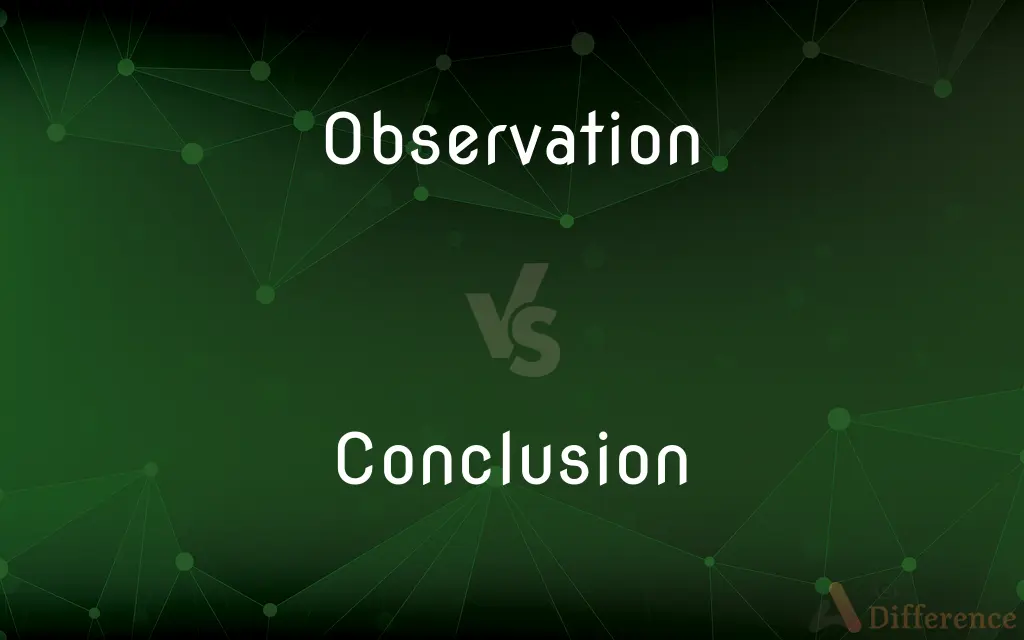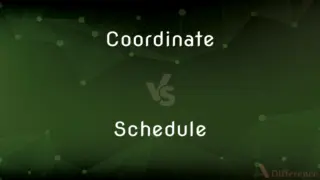Observation vs. Conclusion — What's the Difference?
Edited by Tayyaba Rehman — By Fiza Rafique — Updated on September 29, 2023
Observation is noting a fact or occurrence, while Conclusion is a judgment or decision reached based on observed facts.

Difference Between Observation and Conclusion
Table of Contents
ADVERTISEMENT
Key Differences
Observation and Conclusion play pivotal roles in the process of understanding and reasoning. An Observation refers to the act of noting and recording something using our senses or instruments. On the other hand, a Conclusion is derived from observations and involves drawing inferences or judgments.
When we make an Observation, we are merely registering an occurrence or phenomenon without forming an opinion about it. A Conclusion, conversely, involves taking those observed facts and interpreting or analyzing them, often leading to a judgment or decision.
Observation often serves as the starting point in the scientific method or research. Researchers will make observations to gather data. A Conclusion usually appears towards the end of the process, where researchers interpret the data and determine its significance.
In day-to-day life, we make many Observations—like noting that the sky is cloudy. However, a Conclusion would involve processing that observation and deciding, for instance, that it might rain later based on the cloudy sky.
An Observation can be qualitative (based on qualities, like colors or shapes) or quantitative (based on quantities or numbers). A Conclusion, however, is typically a qualitative statement that summarizes the implications or meaning of the observations.
ADVERTISEMENT
Comparison Chart
Nature
Noting a fact or occurrence
Judgment or decision based on observed facts
Role in Research
Initial data collection
Interpretation and analysis of data
Basis
Direct sensory input or instruments
Inferences or judgments
Involves Interpretation?
No
Yes
Finality
Can be continuous or repeated
Often signifies an end to a thought process
Compare with Definitions
Observation
The monitoring or tracking of behavior or data.
The scientist's Observation of the experiment was meticulous.
Conclusion
The end or finish of an occurrence or process.
The meeting came to a swift Conclusion after the vote.
Observation
A statement based on what one has noticed or perceived.
Her Observation about the changing weather was accurate.
Conclusion
An opinion or decision formed after considering something.
Based on the symptoms, the doctor's Conclusion was that it's a mild infection.
Observation
Monitoring using instruments or devices.
The telescope allows for clearer Observation of distant galaxies.
Conclusion
The close or last part; the end or finish
The conclusion of the festivities.
Observation
Observation is the active acquisition of information from a primary source. In living beings, observation employs the senses.
Conclusion
The result or outcome of an act or process
What was the conclusion of all these efforts?.
Observation
The act of observing
Observations of a rare bird.
Conclusion
A judgment or decision reached after deliberation.
Observation
The power or faculty of observing.
Conclusion
A final arrangement or settlement, as of a treaty.
Observation
The fact of being observed
Kept the suspect under observation.
Conclusion
(Law) The formal closing of a legal complaint or pleading.
Observation
The act or process of perceiving something, such as a phenomenon, often by means of an instrument, and making a record of the resulting information.
Conclusion
A proposition that follows from the premises of a formal proof, for instance from the major and minor premises of a syllogism.
Observation
The result or record of such an act or process
A meteorological observation.
Conclusion
The proposition concluded from one or more premises; a deduction.
Observation
An inference, judgment, or remark that is made by observing
Made some sharp observations about the movie.
Conclusion
The end, finish, close or last part of something.
Observation
The act of observing, and the fact of being observed (see observance)
Conclusion
The outcome or result of a process or act.
Observation
The act of noting and recording some event; or the record of such noting.
Conclusion
A decision reached after careful thought.
The board has come to the conclusion that the proposed takeover would not be in the interest of our shareholders.
Observation
A remark or comment.
Conclusion
(logic) In an argument or syllogism, the proposition that follows as a necessary consequence of the premises.
Observation
A judgement based on observing.
Conclusion
(obsolete) An experiment, or something from which a conclusion may be drawn.
Observation
Performance of what is prescribed; adherence in practice; observance.
Conclusion
(law) The end or close of a pleading, for example, the formal ending of an indictment, "against the peace", etc.
Observation
A regime under which a subject is routinely observed.
Conclusion
(law) An estoppel or bar by which a person is held to a particular position.
Observation
Philosophically as: the phenomenal presence of human being existence.
Conclusion
The last part of anything; close; termination; end.
A fluorish of trumpets announced the conclusion of the contest.
Observation
(stochastics) A realization of a random variable.
Conclusion
Final decision; determination; result.
And the conclusion is, she shall be thine.
Observation
The act or the faculty of observing or taking notice; the act of seeing, or of fixing the mind upon, anything.
My observation, which very seldom lies.
Conclusion
Any inference or result of reasoning.
Observation
The result of an act, or of acts, of observing; view; reflection; conclusion; judgment.
In matters of human prudence, we shall find the greatest advantage in making wise observations on our conduct.
Conclusion
The inferred proposition of a syllogism; the necessary consequence of the conditions asserted in two related propositions called premises. See Syllogism.
He granted him both the major and minor, but denied him the conclusion.
Observation
An expression of an opinion or judgment upon what one has observed; a remark.
To observations which ourselves we makeWe grow more partial for the observer's sake.
Conclusion
Drawing of inferences.
Your wife Octavia, with her modest eyesAnd still conclusion.
Observation
Performance of what is prescribed; adherence in practice; observance.
We are to procure dispensation or leave to omit the observation of it in such circumstances.
Conclusion
An experiment, or something from which a conclusion may be drawn.
We practice likewise all conclusions of grafting and inoculating.
Observation
The act of recognizing and noting some fact or occurrence in nature, as an aurora, a corona, or the structure of an animal.
Conclusion
The end or close of a pleading, e.g., the formal ending of an indictment, "against the peace," etc.
Like the famous ape,To try conclusions, in the basket creep.
Observation
The act of making and recording a measurement
Conclusion
A position or opinion or judgment reached after consideration;
A decision unfavorable to the opposition
His conclusion took the evidence into account
Satisfied with the panel's determination
Observation
The act of observing; taking a patient look
Conclusion
An intuitive assumption;
Jump to a conclusion
Observation
Facts learned by observing;
He reported his observations to the mayor
Conclusion
The temporal end; the concluding time;
The stopping point of each round was signaled by a bell
The market was up at the finish
They were playing better at the close of the season
Observation
The act of noticing or paying attention;
He escaped the notice of the police
Conclusion
Event whose occurrence ends something;
His death marked the ending of an era
When these final episodes are broadcast it will be the finish of the show
Observation
A remark expressing careful consideration
Conclusion
The proposition arrived at by logical reasoning (such as the proposition that must follow from the major and minor premises of a syllogism)
Observation
The act of noting and recording something.
I made an Observation that the plants grow faster in sunlight.
Conclusion
The act of ending something;
The termination of the agreement
Conclusion
A final settlement;
The conclusion of a business deal
The conclusion of the peace treaty
Conclusion
The last section of a communication;
In conclusion I want to say...
Conclusion
The act of making up your mind about something;
The burden of decision was his
He drew his conclusions quickly
Conclusion
A final decision or judgment based on reasoning.
After analyzing the data, my Conclusion is that the hypothesis was correct.
Conclusion
The result or outcome of an act or process.
The investigation's Conclusion revealed no evidence of wrongdoing.
Conclusion
A final part of something, especially a book, movie, or speech.
The story had an unexpected Conclusion that surprised all its readers.
Common Curiosities
What is a Conclusion?
A Conclusion is a judgment or decision made based on reasoning and observed facts.
Can a Conclusion be incorrect?
Yes, a Conclusion can be incorrect if it's based on flawed reasoning or inaccurate observations.
What is an Observation?
An Observation is the act of noting and recording something using senses or instruments.
Is every Observation objective?
While the aim is objectivity, human bias can sometimes influence Observations.
Are Observations used in the scientific method?
Yes, Observations are fundamental in the scientific method, often forming the initial data collection.
Do Observations always lead to Conclusions?
Not always. While Observations can provide data, a Conclusion is derived from interpreting this data.
Can a Conclusion be changed?
Yes, if new evidence or data emerges, a Conclusion might be re-evaluated.
Are Observations always factual?
Observations are based on direct sensory input or measurements and are factual in nature.
Can two people have different Observations of the same event?
Yes, individual perspectives and focus might lead to different Observations.
Is Observation only a visual act?
No, Observation can involve all the senses, not just sight.
Is a Conclusion always the end of a process?
While often signifying an end, a Conclusion can sometimes lead to further questions or exploration.
Can two people draw different Conclusions from the same Observation?
Absolutely, as Conclusions often involve personal reasoning and interpretation.
Why are Conclusions important?
Conclusions help in understanding the significance or implications of the observed data.
Are Conclusions always subjective?
While they involve interpretation, Conclusions aim for objectivity based on available data.
How are Observations recorded?
Observations can be recorded through notes, audiovisual means, or specialized instruments.
Share Your Discovery

Previous Comparison
Attester vs. Attestor
Next Comparison
Coordinate vs. ScheduleAuthor Spotlight
Written by
Fiza RafiqueFiza Rafique is a skilled content writer at AskDifference.com, where she meticulously refines and enhances written pieces. Drawing from her vast editorial expertise, Fiza ensures clarity, accuracy, and precision in every article. Passionate about language, she continually seeks to elevate the quality of content for readers worldwide.
Edited by
Tayyaba RehmanTayyaba Rehman is a distinguished writer, currently serving as a primary contributor to askdifference.com. As a researcher in semantics and etymology, Tayyaba's passion for the complexity of languages and their distinctions has found a perfect home on the platform. Tayyaba delves into the intricacies of language, distinguishing between commonly confused words and phrases, thereby providing clarity for readers worldwide.
















































